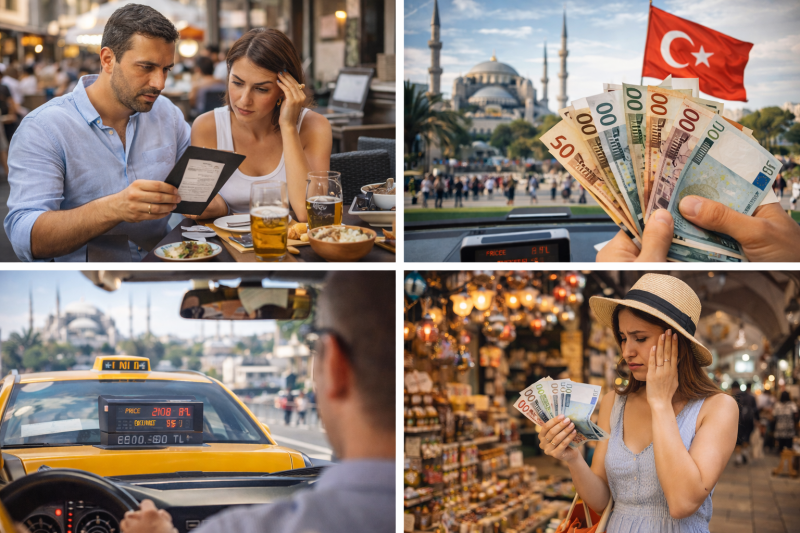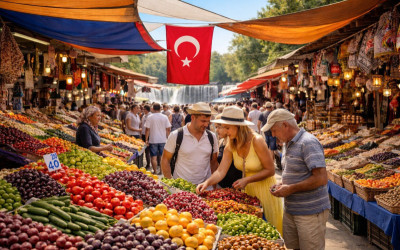Why Have Prices in Turkey Increased in Euros? A Closer Look at Economic Factors
In recent years, it is widely believed that prices in Turkey have increased significantly in euro terms, affecting tourist spending habits. The main reason behind this perception is that exchange rates have lagged far behind rising costs. While costs in Turkey have increased by 5-6 times due to inflation, exchange rates have only risen 3 times. This discrepancy has forced businesses in the tourism sector to raise their prices in euros to stay afloat.
Moreover, tax hikes, particularly in Special Consumption Tax (ÖTV), have driven up alcohol prices far beyond exchange rate increases. As a result, some products are now being compared to European price levels.
This article examines the data and numbers behind this perception.
1. Exchange Rates Did Not Keep Up with Cost Increases
Although the depreciation of the Turkish Lira is often cited as the reason for price increases in Turkey, the truth is that exchange rate gains have not kept pace with inflation.
Euro/TL Exchange Rate vs. Cost Increases
| Year | Euro/TL Rate | Average Inflation (%) | Estimated Cost Increase |
|---|---|---|---|
| 2021 | €1 = 10 TL | 36% | 1x |
| 2022 | €1 = 18 TL | 64% | 2.5x |
| 2023 | €1 = 25 TL | 67% | 4x |
| 2024 | €1 = 33 TL | 64%+ | 5-6x |
Conclusion:
- Between 2021 and 2024, the euro rate tripled, while business costs in the tourism sector increased 5-6 times.
- This imbalance has forced many businesses to increase their prices in euros to cover rising costs.
2. How Inflation and Cost Increases Affected Tourism Services
Rising costs in Turkey have significantly impacted staff wages, energy expenses, and food prices.
Labor Costs
In 2021, the minimum wage in Turkey was 2,825 TL (€282), whereas in 2024, it increased to 17,002 TL (€515).
- Labor costs have risen nearly sixfold.
- Hotels, restaurants, and tourism businesses had to reflect these increases in their pricing.
Energy and Transportation Costs
- Electricity prices have increased by more than 5 times since 2021.
- Fuel prices have surged from around €0.70 per liter in 2021 to nearly €2 per liter in 2024.
- Rising transportation and logistics costs have made both hotel operating expenses and tour prices more expensive.
3. Alcohol Prices Have Increased Far Beyond Exchange Rate Gains
Due to repeated Special Consumption Tax (ÖTV) hikes, the prices of alcoholic beverages have risen far more than the exchange rate.
Alcohol Prices vs. Exchange Rate Increases
| Product | 2021 Price (TL) | 2024 Price (TL) | Increase (%) | 2024 Price (EUR) |
|---|---|---|---|---|
| Beer (50 cl) | 20 TL (€2.00) | 100-150 TL (€3-4.5) | 500-650% | €3-4.5 |
| Rakı (70 cl) | 180 TL (€18) | 1,000-1,400 TL (€30-42) | 650-750% | €30-42 |
| Wine (70 cl) | 50 TL (€5) | 300-600 TL (€9-18) | 600-1100% | €9-18 |
- ÖTV tax hikes have exceeded exchange rate increases by a significant margin, causing alcohol prices to surge far beyond inflation.
- This has led to some alcohol products being priced similarly to European levels.
In popular tourist destinations such as Antalya, Bodrum, Istanbul, and Cappadocia, the rising tax burden has made restaurants and bars noticeably more expensive in euro terms.
4. Bankruptcy Risks and Pricing Strategies in the Tourism Industry
The tourism sector, which heavily relies on services, has been one of the most affected industries by inflation and exchange rate imbalances.
- Businesses operating with lower prices started suffering financial losses.
- To avoid bankruptcy, many hotels and restaurants had no choice but to raise their prices in euros.
- This led to discussions among tourists about whether Turkey is still as affordable as it used to be.
5. Changes in Tourist Spending Habits
Due to rising prices in euro terms, changes in tourist behavior have been observed:
-
Growing preference for all-inclusive hotels.
- As restaurant prices have increased, many tourists now opt for all-inclusive resorts.
-
More supermarket shopping instead of dining out.
- Especially European tourists are choosing to buy food from markets instead of eating at expensive restaurants.
-
Shorter holidays.
- Many tourists who previously spent two weeks in Turkey are now reducing their trips to 7-10 days.
-
Reduced participation in tours and activities.
- Tourists who used to budget for boat tours, water sports, and private excursions are now cutting back on extra spending.
Conclusion: Why Have Prices in Turkey Increased in Euro Terms?
- Exchange rates have lagged far behind cost increases.
- While costs have risen 5-6 times due to inflation, exchange rates have only increased 3 times.
- ÖTV tax hikes have far exceeded exchange rate increases, driving up alcohol prices significantly.
- To avoid bankruptcy, tourism businesses have had to raise their prices in euros.
These developments have contributed to the perception that traveling in Turkey has become more expensive for tourists in euro terms. However, Turkey remains a competitive destination compared to many European locations. The future of Turkey's tourism sector will depend on how these price adjustments are managed moving forward.




